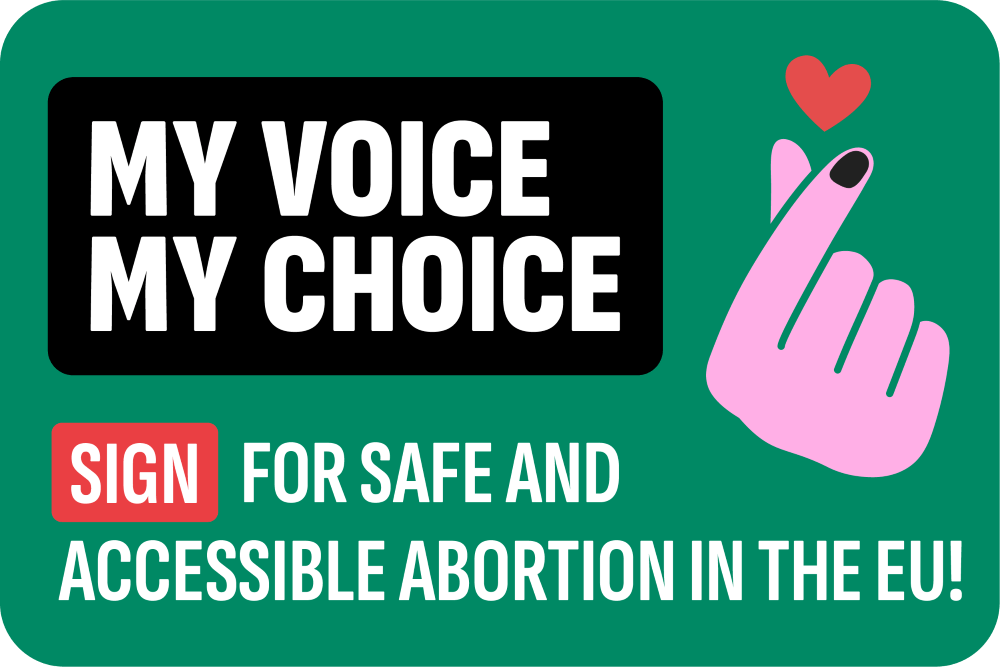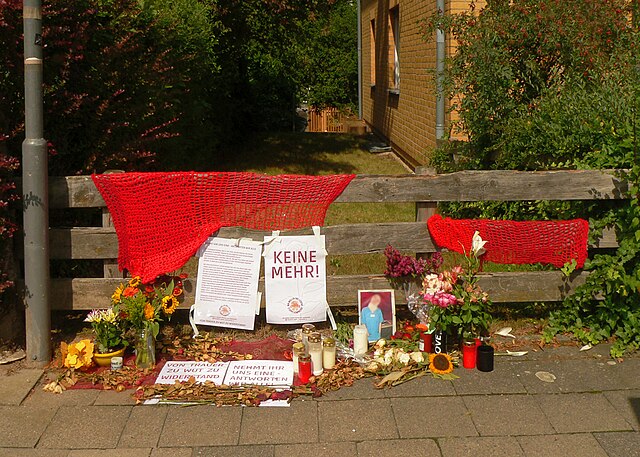On April 24th, 2024, the European Citizens’ Initiative “My Voice, My Choice” was launched, rapidly gaining support with 100,000 signatures within its first week. The campaign addresses the restricted access to abortion in many parts of Europe, where stringent laws pose serious risks to the health of women, as well as many non-binary people and trans men. These laws place significant economic and psychological burdens, especially on those in financially struggling families. The initiative calls on the European Commission to propose financial support for member states that can offer safe abortion services, ensuring that all European women have access to safe and legal abortion care.
Across Europe, access to abortion services vary significantly, reflecting deep-rooted cultural, religious, and political differences among member states. The campaign seeks to unite voices across these diverse contexts, advocating for universal access to abortion as a fundamental human right. However, the campaign faces significant challenges, particularly in countries like Poland, Hungary, and Malta, where abortion laws are among the most restrictive in Europe.
Poland’s stance on abortion is one of the strictest in Europe. In 2020, the Constitutional Tribunal ruled to effectively ban almost all abortions, allowing the procedure only when the mother’s life is in danger or if the pregnancy results from a criminal act such as rape or incest. This ruling sparked widespread protests, with many women seeking abortion services abroad to circumvent the harsh domestic laws. Johanna, a woman from Poland interviewed by Human Rights Watch, experienced the difficulties caused by these strict abortion laws firsthand. When she had serious complications during her pregnancy, she decided to seek an abortion. However, the tougher laws made her doctor afraid to help her, fearing legal consequences. This hesitation left Johanna without the care she needed as her condition worsened. Her story illustrates how the country’s restrictive abortion laws are putting women’s health at risk and making doctors too scared to provide necessary medical help.
The campaign highlights such cases, using them to demonstrate the urgent need for policy change. One emphasis is the campaign’s call for financial support for countries willing to provide safe abortion services, aiming to alleviate the economic burden on women forced to travel abroad for care.
In Hungary, under the leadership of Viktor Orbán, a series of controversial abortion laws have been introduced. These include mandatory counseling and a “heartbeat law,” which requires women to listen to the fetus’ heartbeat before proceeding with an abortion. These measures create significant psychological barriers, making the process more traumatic and leading many women to seek abortions in neighboring countries. Adri, a Hungarian woman, found herself in an increasingly restrictive environment when seeking reproductive healthcare. With Hungary’s abortion laws tightening, she faced numerous bureaucratic obstacles, including mandatory counseling sessions and long waiting periods, which added stress and uncertainty to an already difficult decision. Unable to access the care she needed, Adri decided to travel to Austria, where abortion services are more accessible and supportive. Her experience reflects the growing trend of Hungarian women crossing borders to seek medical care, as restrictive laws at home force them to look elsewhere for their reproductive rights. The campaign uses stories like Adri’s to show the emotional and psychological toll of such policies, pushing for EU-wide support that would reduce the need for cross-border travel and ensure women can access safe, legal abortions in their own countries.
Malta has the strictest abortion laws in Europe, with abortion only permitted if the woman’s life is in serious danger. This severe restriction reflects Malta’s strong Roman Catholic heritage, where even limited access to abortion services faces strong opposition. The re-election of the Maltese politician Roberta Metsola as President of the European Parliament, despite her anti-abortion views, has heightened concerns among reproductive rights advocates about the future of abortion access in Europe. The My Voice, My Choice campaign is particularly critical of Malta’s laws, arguing that they deny women the basic right to make decisions about their own bodies. The campaign advocates for the EU to take a stronger stance in challenging the harsh restrictions still in place in countries like Malta.
In Italy, although abortion was legalized in 1978, cultural and religious influences continue to create significant barriers to access. Over 70% of Italian gynecologists refuse to perform abortions due to conscientious objection, making it difficult for women to find providers willing to carry out the procedure. Additionally, recent laws allowing pro-life protesters to demonstrate inside clinics have sparked public outrage and raised concerns about the erosion of women’s privacy and autonomy. The campaign draws attention to these ongoing issues in Italy, further emphasizing the need for EU intervention to protect reproductive rights. By highlighting the widespread practice of conscientious objection, the campaign seeks to ensure that women in Italy and other countries facing similar challenges can access abortion services without fear of stigma or harassment.
Germany’s abortion laws, though more liberal than those in Poland or Malta, still reflect a conservative approach. Abortion is technically illegal but not punishable if performed within the first 12 weeks of pregnancy following mandatory counseling. Recent proposals to decriminalize abortion entirely have sparked debate, with strong opposition from religious groups and conservatives who argue that such changes would undermine the country’s moral fabric. The campaign views Germany as a critical battleground for reproductive rights in Europe. Despite its relatively liberal laws, access remains restricted. As a leading EU member state, reforms in Germany could inspire broader changes across the continent, encouraging other nations to reassess their restrictive policies and ensuring that no one is denied the reproductive healthcare they need.
My Voice, My Choice aims to collect one million signatures by the end of April 2025, which would make the European Commission to consider recognizing it as a European Citizens’ Inititative. At the beginning of August, the campaign announced that it still needs 450,000 signatures to reach this goal. Its success could lead to significant policy changes, including increased EU funding for member states that provide safe abortion services and greater pressure on countries with restrictive laws to align with European human rights standards. Beyond policy change, the campaign also seeks to reshape public opinion across Europe. By raising awareness of the struggles women face in countries with restrictive abortion laws, the campaign hopes to foster a more supportive environment for reproductive rights, encouraging a shift in societal attitudes that could pave the way for more progressive legislation in the future.
With the campaign’s momentum growing, it has become a powerful call to action for women throughout Europe. It challenges the fragmented system of national abortion laws that leave millions without access to safe and legal services, calling for a unified European approach that recognizes abortion as a fundamental human right. In a continent where cultural, religious, and political differences often create deep divides, the campaign seeks to build bridges, advocating for a Europe where no one has to suffer or die because of restrictive abortion laws.
You can find more information about the campaign My Voice, My Choice here.




